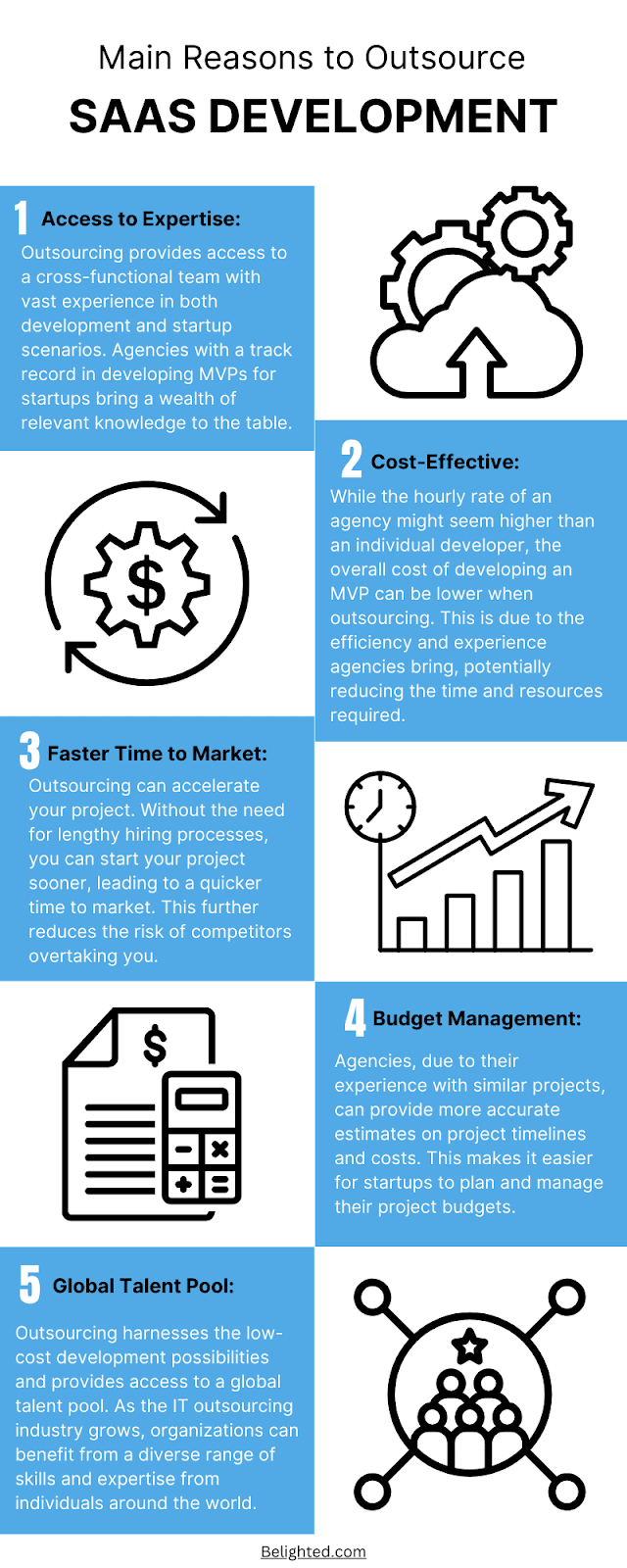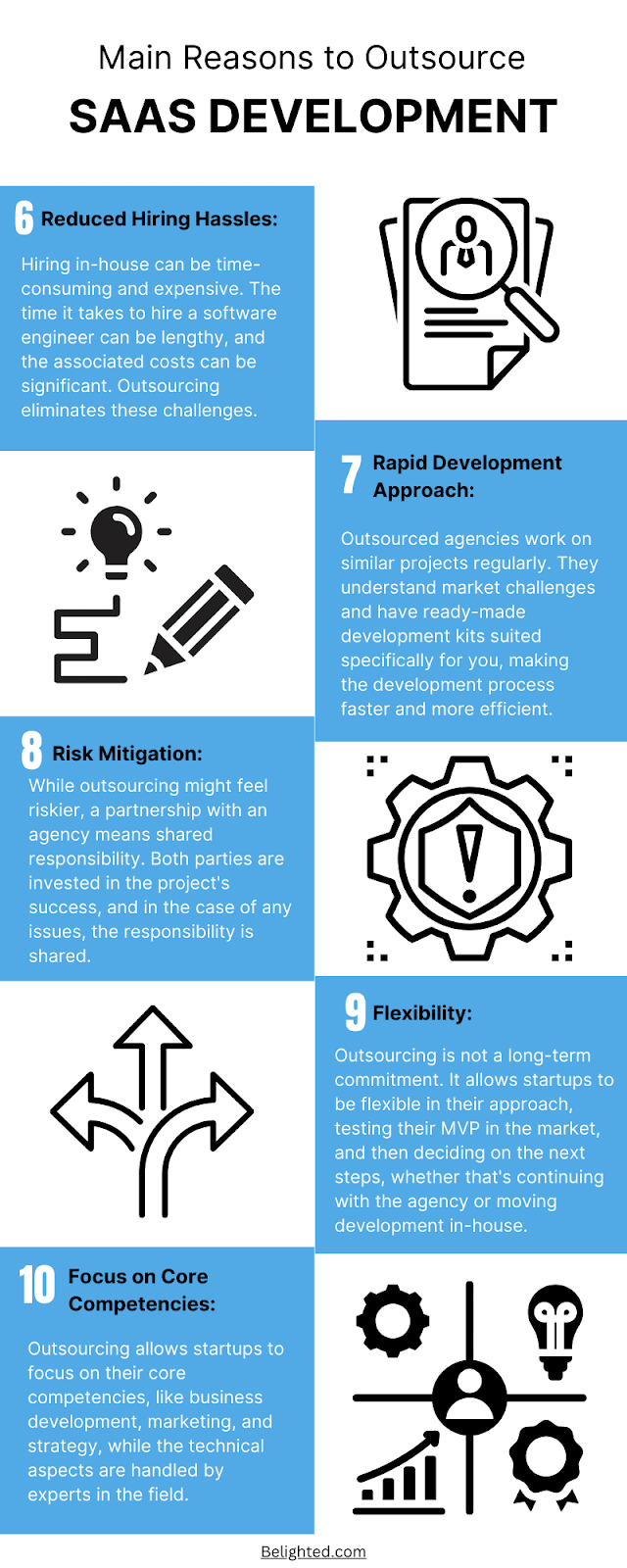Understanding the Outsourcing of Your SaaS Development



Pros:
Access to a Cross-Functional Team: Outsourcing provides a diverse team, often at a lower cost than hiring individually.
Get Started Sooner: Faster project acceleration and reduced time-to-market compared to in-house hiring.
Access to Experience: Agencies often bring vast development and startup experience.
Easier Budget Planning and Management: Agencies can more accurately predict project duration and costs due to their past experience with similar types of projects.
Agency vs. Employee Relationship: An agency relationship promotes more of a partnership dynamic with shared responsibilities.
Cons:
Potentially Higher Cost: Per-hour agency rates may seem higher, but overall costs can vary.
Less Visibility: Outsourcing SaaS development can reduce immediate insight into project progress.
Feels Higher Risk: Outsourcing can feel like relinquishing control and may raise IP concerns.
Not a Long-Term Solution: Outsourcing isn't scalable forever; in-house development becomes necessary in the long run.
Agency vs. Employee Relationship: Expectation management differs between agencies and employees as you cannot demand additional hours or added work without discussing it first or paying for it.
Conclusion: Non-technical founders have multiple options for MVP development, including outsourcing. For more strategies, refer to Belighted’s eGuide.
Developing your minimum viable product is a crucial first step on your startup journey.
One of the most common challenges faced by non-technical founders is how to handle the development work, when they lack the technical skills themselves. One option is to outsource development of your MVP - but is this a good option for your startup?
Outsourcing provides SaaS companies with the advantage of tapping into global talent without the overheads of hiring full-time. This approach allows for flexibility as you don’t need to spend time managing an in-house team, access to specialized tools and unique expertise, as well as cost savings. Your time-to-market is also reduced with an outsourced agency, as they prioritize your project if there are pressing deadlines. Especially for startups or companies in their early stages, outsourcing can be a strategic move to rapidly develop and iterate their software products without committing to long-term in-house teams.
One of the main benefits of outsourcing MVP development to an agency is that you get access to a cross-functional team. As a startup, hiring the five different people you need to develop different pieces of your MVP will be much more expensive than partnering with an agency.
Outsourcing MVP development can accelerate your project as it’s easier and faster to get started compared with hiring in-house development resource: you don’t need to allow time for sourcing applicants, reviewing applications, interviewing, or waiting out notice periods.
This means you benefit from faster time to market, so there’s less risk of you being beaten by your competitors.
The agency team you’re outsourcing to will have much more experience than if you were to hire a team of developers in-house for a similar cost.
This is the same across both development experience, and startup experience: if you select an agency with a track record of developing MVPs for startups, they will have a wealth of relevant knowledge and experience to bring to your project that you wouldn’t necessarily get from hiring a developer (or team of developers).
Agencies will have a pretty good idea of how long a project will take them, and how much it will cost. This is thanks to them doing similar types of project over and over again, so they know what to expect. In contrast, it’s less easy for employees to accurately estimate how long a project will take - and therefore for you to estimate how much it will cost.
The relationship you have with an agency is very different to the relationship with an employee. With an agency it’s more of a partnership; you’re both invested in working together, and you can share responsibility for the project (even if something goes wrong). In contrast, with an employee, they report to you, meaning you are ultimately responsible.
Certainly! Building in-house gives you direct control and can foster a deep alignment with your company's vision. However, it requires significant investment in hiring, training, and managing a development team, which might not be feasible for all startups, especially in the fundamental stages.
If you directly compare the cost per hour of a single employee vs an agency, it will appear more expensive to work with an agency. However, this isn’t an accurate reflection of the total cost of developing your MVP: you may need to work with multiple employees, which will increase the cost, and it’s likely to take an employee much longer to complete your MVP compared with an agency - so the cost per hour of each isn’t directly comparable.
If you outsource MVP development, you lose a degree of visibility into the progress being made on the project. When you’re doing the development work in-house, it’s relatively easy to see when your dev team are working on your MVP. But when it’s outsourced, you don’t have the same immediate visibility, and there’s a degree of trust required to feel confident that the agency are putting in the time and effort to complete your MVP to the agreed timeline.
Outsourcing MVP development feels much riskier than if you handle it in-house. It’s not uncommon to feel like you’ve relinquished some control over the project when you outsource to an external team, and you may even worry that your intellectual property is at-risk. With that said, these (usually unfounded!) concerns tend be the same for first-time founders - whether they’re working with an agency, or sharing their startup idea with a potential employee for the first time.
At some point, it’s going to make more sense to bring your startup’s development work in-house. Outsourcing development won’t work for your startup forever: it’s not a scaleable solution. However, if you avoid outsourcing development in the beginning, for fear of it not working later, you run the risk of wasting time and energy worrying about premature scaling, and trying to do too much, too soon.
The differences between your relationship with an agency or an employee can be a positive - or it can seem like a drawback. You can’t expect the same working practices from an agency as you would an employee - you can’t ask them to work 16-hour days building your MVP, or expect regular weekend working - at least, not without paying extra for it.
The cost of outsourcing SaaS development varies based on the complexity of the project, the expertise required, and the region where the agency is based. While agency rates might seem higher on an hourly basis compared to in-house developers, the overall project cost can be competitive, considering the efficiency and expertise agencies bring. It's essential to get detailed quotes and ensure transparency in billing to avoid unexpected costs.
Non-technical founders can take several different approaches to MVP development - including outsourcing to an agency. To learn more about the six different MVP development strategies used by cutting-edge startups, download our free eGuide.

